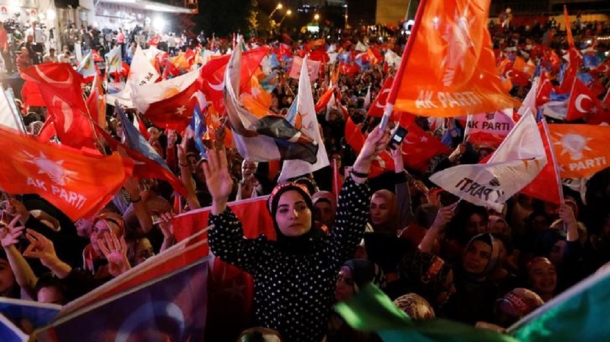
The Turkish presidential and parliamentary elections of 24 June 2018 were perhaps the most important in the country since the adoption of democratic pluralism in 1950. The first to follow the narrowly approved constitutional amendments that will turn Turkey into a presidential system, the elections were widely viewed as a test for President Recep Tayyip Erdogan and his vision.
On the presidential front, the biggest question in the run-up to the poll was whether Erdogan could win an outright victory or would be forced into a run-off. He faced an unprecedented number of challengers from across the political spectrum, and observers speculated whether his main ally, the Nationalist Movement Party (MHP), could deliver the nationalist conservative votes he needed after losing some of its own supporters and leaders to a splinter party, the Good Party.
With voter turnout reaching a whopping 87 percent, Erdogan claimed victory in the first round with 52 percent of the vote, slightly more than his 2014 victory. Muharrem Ince, the candidate for the Republican People’s Party (CHP) came in second with 30 percent of the vote, with all other candidates trailing far behind.
Parliamentary elections were more complicated. The constitutional amendments increased the size of parliament and entailed redistricting and a new vote-counting system. While the new system maintained the 10-percent threshold of votes required for parties to win a seat in parliament, it allowed party coalitions, which would give smaller parties a chance to enter parliament on the coattails of bigger ones.
This provision was a double-edged sword for Erdogan’s Justice and Development Party (AKP). The MHP and AKP came together in the People’s Alliance, thus ensuring that the MHP, which was widely predicted to fall short of the 10-percent threshold, would enter parliament. It faced the Nation Alliance, a coalition of the CHP—the primary opposition party—the Good Party and several small parties, whose parliamentary chances were similarly bolstered through the alliance. The Kurdish Peoples’ Democratic Party (HDP) ran on its own, amid questions about whether it could break the 10-percent threshold and what this would mean for the AKP parliamentary majority.
In the end, the AKP won 42 percent of the vote, down from 49 percent in 2015. Defying expectations, the MHP won 11 percent. The AKP therefore lost its majority, but with its coalition partner it ended up with 340 of 600 seats. The Nation Alliance came away with 192 seats, while the HDP won 67 seats. The sharp decline in AKP support is most likely due to growing popular discontent with the government’s performance over the last two years combined with hints of an impending economic crisis and the personal scandals of some AKP figures.
So what does it all mean? Despite some upended expectations, the elections demonstrated Erdogan’s astonishing capacity for survival and the Turkish public’s desire for stability. The results of both polls suggest that Turkey’s final transition to the presidential system will be smooth. Despite reservations about the amendments, the Turkish electorate seems to have placed its faith in Erdogan as the man capable of meeting the security and economic challenges facing the country.
The hit to the AKP, however, suggests that this support is conditional. With their parliamentary choices, voters seem to be telling the party it has one last chance to get its internal house in order and rise to the challenges Turkey faces. The AKP will now need the MHP to act as an effective parliamentary force, and if there is one lesson to be learned from Turkish party politics, it is that the MHP is not always a reliable partner.
The elections cleared up some uncertainties while leaving some questions unanswered. It is certain that the state of emergency will not be renewed. Erdogan has promised a new approach to the Alevi minority, but it is unclear if the regime will pursue a rapprochement with the Kurdish population. What is certain is that Erdogan and his party have lost much Kurdish support and will not reclaim it without a new, positive approach to the Kurdish question.
Economically, Erdogan is likely to to pursue austerity measures in light of growing inflation and a depreciating currency, without which it will be difficult to contain the impending crisis.
In foreign affairs, US-Turkish relations are warmer, but there are still outstanding questions about Turkey’s ties with NATO, especially in Syria, and it needs to take a new tack in its relations with the EU. Regionally, any changes in Turkey’s policies toward its Arab and Iranian neighbours are likely to be gradual, but Erdogan’s success and the clarity it brings to the Turkish political landscape has undoubtedly reassured the AKP government’s regional allies.
*This is a summary of a policy brief originally written in Arabic, available here: http://studies.aljazeera.net/ar/positionestimate/2018/06/180627075203150.html.